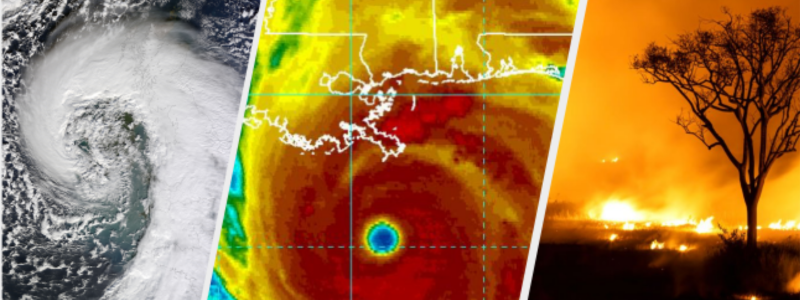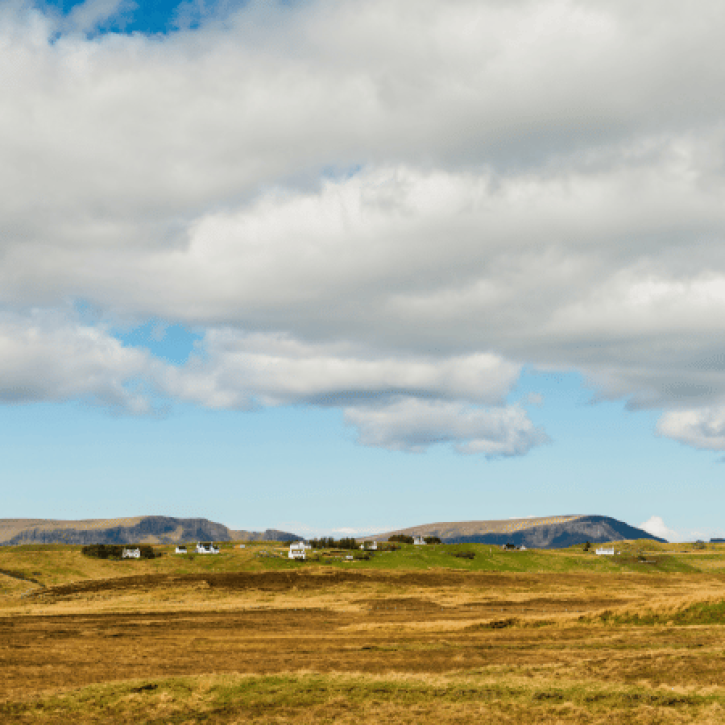

Weather and Climate Hazards: Impact Forecasting and Modelling Insights for the Insurance Sector
LOCATION
Virtual - Hosted on Zoom
This webinar will be an opportunity for weather and climate scientists, catastrophe modellers, and those in the insurance industry to gain an insight into the latest research on the modelling, representation, and impact of weather and climate hazards around the globe. Extreme meteorological events can have catastrophic socio-economic impacts and utilising the latest climate model and analysis techniques allows for vital insight into these phenomena. Topics covered will include Tropical Cyclones, European Windstorms, heatwaves and drought forecasting for humanitarian aid. This webinar will highlight areas of active collaboration between the insurance sector and academia and how cutting-edge research has an application in day-to-day business. Three speakers will give 15-minute presentations on their latest work, followed by a short Q&A. The webinar will conclude with a panel discussion featuring the speakers and led by members of the RMetS Insurance Special Interest Group.
Biographies and Abstracts
James Done
National Center for Atmospheric Research, US
WTW Senior Academic Fellow
Dr. James Done leads the Capacity Center for Climate and Weather Extremes at the National Center for Atmospheric Research. He is also Senior Academic Fellow of the WTW Research Network. His climate research extends across a range of extreme weather and climate phenomena and connects with risk managers to strengthen the science and ensure outcomes are useful, usable, and used. In recognition of his scientific leadership, he testified before the U.S. Congress on extreme weather in a changing climate. Dr. Done received his PhD in Meteorology from the University of Reading, UK in 2003.
Abstract:
Process-Based Modeling of Tropical Cyclone Wind Risk
Integrating process-based modeling of weather and climate with risk assessment has the potential to transform our understanding of weather and climate risk. Potential benefits include event-set generation in regions of sparse historical data, understanding dependencies among perils, and informing views of risk in a changing climate.
I will show an example of combining process-based and parametric modeling in support of understanding inland TC wind risk. A computationally efficient approach to modeling global TC wind footprints will be presented that i) fits a parametric wind field model to best track data, and ii) brings the winds down to the surface using a process-based model of winds in the lowest 2km of the atmosphere. This approach accounts for the effects of terrain and changes in surface roughness on the winds as TCs make landfall. The resulting wind footprints for historical US hurricanes compare favorably to surface station observations and high-resolution numerical simulations. Broad applications will be discussed including real-time footprint forecasting, historical footprint reconstructions, and wind exceedance probability assessments.
Sandra Hansen
Head of International Catastrophe Advisory, Guy Carpenter
Sandra Hansen leads the International Catastrophe Advisory (ICA) team at Guy Carpenter in London, applying scientific research to the insurance industry. The ICA team is active in fields such as catastrophe model evaluation, climate change, and event response. Sandra is a qualified actuary and has a Masters degree in Mathematics from the University of Oxford and in Atmosphere, Ocean and Climate at the University of Reading. Sandra joined Guy Carpenter in 2017, having previously worked as an actuary for seven years.
Abstract:
Using seasonal forecasts to enhance our understanding of extreme windstorms
Windstorms pose continual risk to Europe, threatening infrastructure, life and billions of pounds in insured losses. The most extreme windstorms that could potentially occur in the current climate are estimated using seasonal forecast data together with a cyclone-tracking algorithm, and their potential losses quantified using a Storm Severity Index (SSI). Nearly 700 extended winter seasons of forecast data are analysed, representing a much larger sample of potential windstorms compared to that available from reanalysis or observational products. This dataset provides a valuable reference for validating and building catastrophe risk models, for understanding worst-case storms, windstorm variability, clustering, cross country correlation, and more.
Sem Vijverberg
Beyond Weather
Sem Vijverberg’s PhD research focussed on data-driven long-range weather forecasting, with a focus on physical understanding and causality. He has a background in Climate Physics (Utrecht University) and is passionate to make a positive impact on society. His work lays the foundation for the spin-off (“Beyond Weather”) that brings interpretable data-driven forecasts to society. His free time is occupied with a wide variety of activities, including different types of sports, making music, and hitting the road with a campervan.
Abstract:
Crop yield & drought forecasting months in advance using machine learning.
A lack of reliable long-range weather forecasts has always meant an exposure to weather-related risks for our societies. This exposure has grown and will continue to do so in the coming decades with the combined trend of more frequent weather extremes and a mean shift in climate zones. S2S weather forecasts are highly important for both the agricultural and humanitarian aid sectors. Weather is often the biggest driver of fluctuations in crop yield. Similarly, providing aid before climate disasters strike is an upcoming theme within humanitarian organizations. However, operational forecasts at seasonal to sub-seasonal timescales (S2S), are insufficiently ‘actionable’, i.e. they are often not reliable enough to support decision making. Yet there appears to be an untapped potential for machine learning to improve the quality and ‘actionability’ of these long-range forecasts. To address this issue, we have started a spin-off company (“Beyond Weather”) from the Vrije Universiteit Amsterdam. I will present some work done during my PhD, as well as share an ongoing project we are doing to help humanitarian organizations.
Registration
Registration for this event is now closed
This webinar will be an opportunity for weather and climate scientists, catastrophe modellers, and those in the insurance industry to gain an insight into the latest research on the modelling, representation, and impact of weather and climate hazards around the globe. Extreme meteorological events can have catastrophic socio-economic impacts and utilising the latest climate model and analysis techniques allows for vital insight into these phenomena. Topics covered will include Tropical Cyclones, European Windstorms, heatwaves and drought forecasting for humanitarian aid. This webinar will highlight areas of active collaboration between the insurance sector and academia and how cutting-edge research has an application in day-to-day business. Three speakers will give 15-minute presentations on their latest work, followed by a short Q&A. The webinar will conclude with a panel discussion featuring the speakers and led by members of the RMetS Insurance Special Interest Group.
Biographies and Abstracts
James Done
National Center for Atmospheric Research, US
WTW Senior Academic Fellow
Dr. James Done leads the Capacity Center for Climate and Weather Extremes at the National Center for Atmospheric Research. He is also Senior Academic Fellow of the WTW Research Network. His climate research extends across a range of extreme weather and climate phenomena and connects with risk managers to strengthen the science and ensure outcomes are useful, usable, and used. In recognition of his scientific leadership, he testified before the U.S. Congress on extreme weather in a changing climate. Dr. Done received his PhD in Meteorology from the University of Reading, UK in 2003.
Abstract:
Process-Based Modeling of Tropical Cyclone Wind Risk
Integrating process-based modeling of weather and climate with risk assessment has the potential to transform our understanding of weather and climate risk. Potential benefits include event-set generation in regions of sparse historical data, understanding dependencies among perils, and informing views of risk in a changing climate.
I will show an example of combining process-based and parametric modeling in support of understanding inland TC wind risk. A computationally efficient approach to modeling global TC wind footprints will be presented that i) fits a parametric wind field model to best track data, and ii) brings the winds down to the surface using a process-based model of winds in the lowest 2km of the atmosphere. This approach accounts for the effects of terrain and changes in surface roughness on the winds as TCs make landfall. The resulting wind footprints for historical US hurricanes compare favorably to surface station observations and high-resolution numerical simulations. Broad applications will be discussed including real-time footprint forecasting, historical footprint reconstructions, and wind exceedance probability assessments.
Sandra Hansen
Head of International Catastrophe Advisory, Guy Carpenter
Sandra Hansen leads the International Catastrophe Advisory (ICA) team at Guy Carpenter in London, applying scientific research to the insurance industry. The ICA team is active in fields such as catastrophe model evaluation, climate change, and event response. Sandra is a qualified actuary and has a Masters degree in Mathematics from the University of Oxford and in Atmosphere, Ocean and Climate at the University of Reading. Sandra joined Guy Carpenter in 2017, having previously worked as an actuary for seven years.
Abstract:
Using seasonal forecasts to enhance our understanding of extreme windstorms
Windstorms pose continual risk to Europe, threatening infrastructure, life and billions of pounds in insured losses. The most extreme windstorms that could potentially occur in the current climate are estimated using seasonal forecast data together with a cyclone-tracking algorithm, and their potential losses quantified using a Storm Severity Index (SSI). Nearly 700 extended winter seasons of forecast data are analysed, representing a much larger sample of potential windstorms compared to that available from reanalysis or observational products. This dataset provides a valuable reference for validating and building catastrophe risk models, for understanding worst-case storms, windstorm variability, clustering, cross country correlation, and more.
Sem Vijverberg
Beyond Weather
Sem Vijverberg’s PhD research focussed on data-driven long-range weather forecasting, with a focus on physical understanding and causality. He has a background in Climate Physics (Utrecht University) and is passionate to make a positive impact on society. His work lays the foundation for the spin-off (“Beyond Weather”) that brings interpretable data-driven forecasts to society. His free time is occupied with a wide variety of activities, including different types of sports, making music, and hitting the road with a campervan.
Abstract:
Crop yield & drought forecasting months in advance using machine learning.
A lack of reliable long-range weather forecasts has always meant an exposure to weather-related risks for our societies. This exposure has grown and will continue to do so in the coming decades with the combined trend of more frequent weather extremes and a mean shift in climate zones. S2S weather forecasts are highly important for both the agricultural and humanitarian aid sectors. Weather is often the biggest driver of fluctuations in crop yield. Similarly, providing aid before climate disasters strike is an upcoming theme within humanitarian organizations. However, operational forecasts at seasonal to sub-seasonal timescales (S2S), are insufficiently ‘actionable’, i.e. they are often not reliable enough to support decision making. Yet there appears to be an untapped potential for machine learning to improve the quality and ‘actionability’ of these long-range forecasts. To address this issue, we have started a spin-off company (“Beyond Weather”) from the Vrije Universiteit Amsterdam. I will present some work done during my PhD, as well as share an ongoing project we are doing to help humanitarian organizations.
Registration
Registration for this event is now closed





